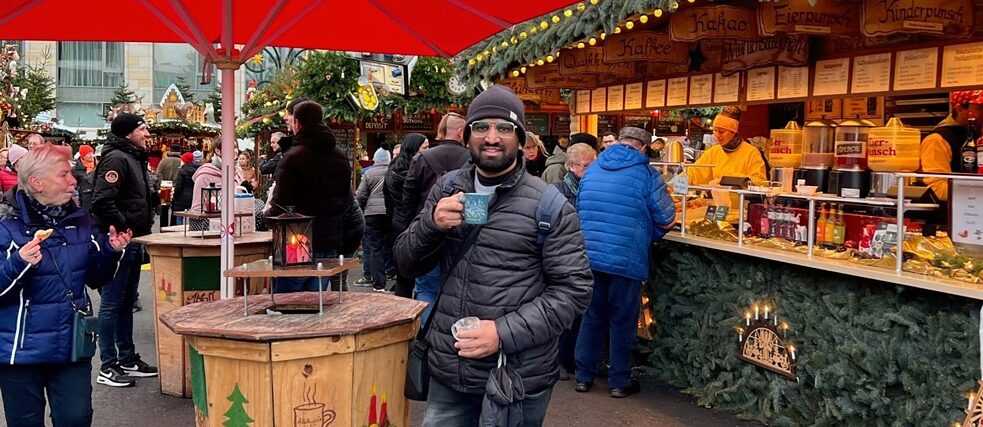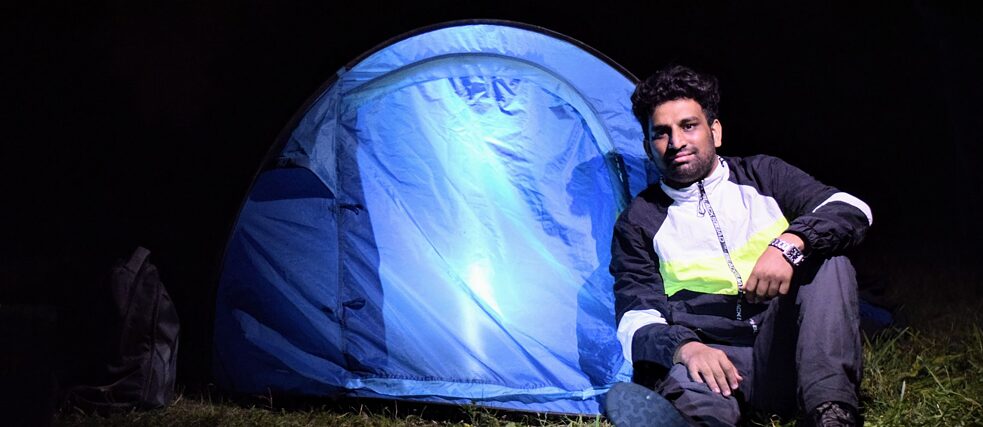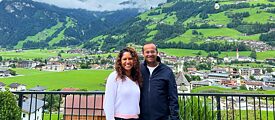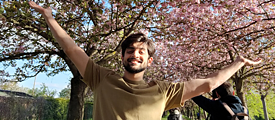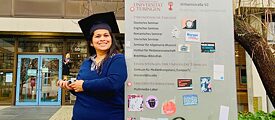Shanmukha Siddaramu
Age: 29 years
Origin: Bangalore, India
Location in Germany: Karlsruhe
Profession: Research Assistant at Karlsruhe Institute of Technology
Shanmukha's Life in Germany
I came to Germany in October 2019 to study scientific instrumentation at the University of Applied Sciences, Jena. The days leading up to my trip are a blur now, but I clearly remember them being stressful. It was to be my first overseas trip. I was the first person in my family to get a passport, so it was exciting.
However, just as the trip was nearing, I wanted to pack in as many local travels as I could in India before leaving for Germany because I didn’t know when I would be back. I used to live in Bangalore, worked for Infosys and had to bid goodbye to a lot of friends. Everything put together, winding my life up in India proved difficult and I fell sick.
Germany was among my top three countries of choice for higher studies. Germany was particularly attractive because education in public universities was practically free, and the courses were in English. I did need to show proof of German language, but I was offered the choice of learning German at the university in parallel to my regular courses.
When I returned in 2021, it was time for my internship in Erlangen. Germany was still cautious about Covid, and things weren’t yet open. The firm I interned with still had its employees working from home. But as an intern, I had to go in because they couldn’t offer me a laptop. I got to experience German work culture when I moved to Dresden to work with another firm for my master thesis.
As you can tell, I had barely finished two semesters at the university before which I could find internship and thesis-related work. This is something I found fascinating about studying masters in Germany. It’s easy to find employment in the technology industry as employers are hungry for new talent, and students offer them the perfect balance – the students are offered minimum, yet a livable wage, and could only work for certain hours because of restrictions.
To combat my homesickness, I started exploring hiking around the cities I have lived in. I found that I could connect to the country on a deeper level by being in nature. I love that German cities are never too far from a hiking trail. I have hiked in and around Jena, Dresden and continue the tradition where I live now, in Karlsruhe, by going on regular hikes. I found like-minded groups on Facebook and other social media platforms. Hiking has helped me connect with nature in Germany.
After finishing my studies and submitting my master thesis, I’ve taken up a job as a Research Assistant at the Karlsruhe Institute of Technology in South Germany. Although I am employed full-time, I hope to pursue a doctorate at the same institute.
However, just as the trip was nearing, I wanted to pack in as many local travels as I could in India before leaving for Germany because I didn’t know when I would be back. I used to live in Bangalore, worked for Infosys and had to bid goodbye to a lot of friends. Everything put together, winding my life up in India proved difficult and I fell sick.
Nervous first overseas trip
I took the flight while on medication, but my anxieties disappeared as soon as I landed in Frankfurt because I met a bunch of Indian students who were on my train to Jena going to my university. I still nurtured homesickness for a month or two as I lived in Jena and spent my time between my dorm and my classes.Study buddy helped me during my first days
What helped me hugely during my initial days in Germany was the fact that my university appointed a study buddy. He assisted me to settle in by showing me everything from shopping at a supermarket to taking the tram and navigating the bureaucracy. It was one of the nicest things to do and I greatly appreciate that my university had this program to help international students.Germany was among my top three countries of choice for higher studies. Germany was particularly attractive because education in public universities was practically free, and the courses were in English. I did need to show proof of German language, but I was offered the choice of learning German at the university in parallel to my regular courses.
Student life at the university was cut short by the pandemic
I attended the winter semester in 2019 and though initially I found the German winter very cold because I am not used to it, I started exploring the city and familiarizing myself with the German way of living. Yet, my homesickness got the best of me, and I left for a short vacation during my semester break in March 2020. Right before I could return, COVID-19 shut the world down and I couldn’t return. My classes moved online, and I finished my subsequent semester in India, locked down in my home.Transitioning from University to a work environment
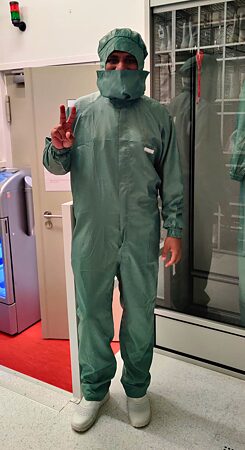 Shanmukha at his workplace.
| © Shanmukha Siddaramu
Shanmukha at his workplace.
| © Shanmukha Siddaramu
When I returned in 2021, it was time for my internship in Erlangen. Germany was still cautious about Covid, and things weren’t yet open. The firm I interned with still had its employees working from home. But as an intern, I had to go in because they couldn’t offer me a laptop. I got to experience German work culture when I moved to Dresden to work with another firm for my master thesis.As you can tell, I had barely finished two semesters at the university before which I could find internship and thesis-related work. This is something I found fascinating about studying masters in Germany. It’s easy to find employment in the technology industry as employers are hungry for new talent, and students offer them the perfect balance – the students are offered minimum, yet a livable wage, and could only work for certain hours because of restrictions.
Win-win situation
I find this temporary relationship with the employer a win-win situation for me since I could make money and support myself while still studying. Besides attendance in classes at the university is not mandated. So, I could self-study and if I wanted to work full-time, that was possible too. The professors I encountered so far have been unfailingly friendly, going out of their way to help a student to whom it’s a completely new environment.Tongue-tied initially, freed up later: how learning German liberated me
Outside the university, I had a hard time adjusting to life in Jena for the first few months because I had limited German knowledge. For fear of being tongue-tied in public, I shut myself up and spent my days from class to dorm room. Eventually, I learned the language and found the confidence to read menus and order food at restaurants and interact with cashiers at supermarkets and bakeries. My German is still basic and I am learning, but it is far better than what it used to be when I arrived in Germany.Hiking to My rescue!
Shanmukha bei einem seiner Campingausflüge.
To combat my homesickness, I started exploring hiking around the cities I have lived in. I found that I could connect to the country on a deeper level by being in nature. I love that German cities are never too far from a hiking trail. I have hiked in and around Jena, Dresden and continue the tradition where I live now, in Karlsruhe, by going on regular hikes. I found like-minded groups on Facebook and other social media platforms. Hiking has helped me connect with nature in Germany.
After finishing my studies and submitting my master thesis, I’ve taken up a job as a Research Assistant at the Karlsruhe Institute of Technology in South Germany. Although I am employed full-time, I hope to pursue a doctorate at the same institute.
Rapid Fire with Shanmukha
How do you stay connected with the Indian community in Germany?
Through my Indian colleagues who invite me home on festivals and other occasions.
What advice would you give to someone who is planning to move to Germany for work or
studies?
Initially, it’s not going to be easy, so prepare for that. You might miss your friends and everything familiar to you. Never be home-stuck, roam and explore your city. Go out and the world will open for you.
How would you describe Germany in three words?
Peaceful, Autobahn, and nature!
What do you enjoy most about living in Germany, and what do you miss the most about India?
I enjoy, just like any average German, the no-speed limit rule on the Autobahn. I use car sharing a lot and it helps me get to places easily. I love the nature here and the ability to go on hikes and be outdoors. About India, I miss the familiarity it offers, rootedness, food, parents, friends, and my bike.
Through my Indian colleagues who invite me home on festivals and other occasions.
What advice would you give to someone who is planning to move to Germany for work or
studies?
Initially, it’s not going to be easy, so prepare for that. You might miss your friends and everything familiar to you. Never be home-stuck, roam and explore your city. Go out and the world will open for you.
How would you describe Germany in three words?
Peaceful, Autobahn, and nature!
What do you enjoy most about living in Germany, and what do you miss the most about India?
I enjoy, just like any average German, the no-speed limit rule on the Autobahn. I use car sharing a lot and it helps me get to places easily. I love the nature here and the ability to go on hikes and be outdoors. About India, I miss the familiarity it offers, rootedness, food, parents, friends, and my bike.
